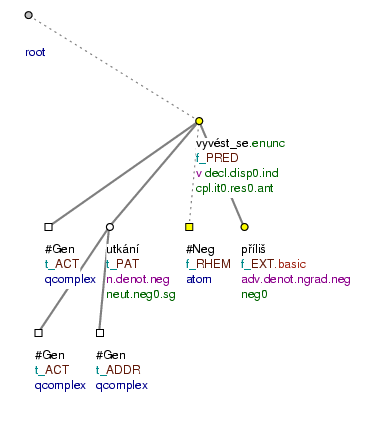EXT modifications answer questions like: "how much/many?" or "to what extent?".
Subfunctors. The EXT functor is further specified by subfunctors. See Section 13.1.7, "Subfunctory with the EXT functor".
EXT modifications can modify verbs (e.g.: Otevřel dveře dokořán.EXT (=He opened the door wide)), adjectives (e.g.: cele.EXT oddaný (=fully devoted)), adverbs (e.g.: velmi.EXT opatrně (=very cautiously)), but also nouns (e.g.: V nádobě je asi.EXT litr. (=There is approximately one litre (of water) in the container)).
EXT modifications can also modify prepositions (e.g: zcela.EXT pod stolem (=completely under the table)). See Section 17.2, "Closer specification of prepositions".
Valency. EXT modifications are obligatory with a number of verbs, especially those with the meaning of buying or selling; e.g.: platit (=pay) (platil mu 1000.EXT za schránku (=He paid him 1000 for the postbox)), vycházet (=here: cost) (pobyt vychází na 10 000 Kč.EXT (=the stay costs 10 000 Kc)), činit (=make) (poplatek činí 30 Kč.EXT (=the fee is (makes) 30 Kc)), but also with other verbs, which are used for expressing quantity; e.g. vážit (=weigh) (syn váží 57 kg.EXT (=their son weighs 57 kg)), měřit (=measure) (stromek měřil přes dva metry.EXT (=the tree was over two meters tall)), zabírat (=take up) (prodej zabírá polovinu.EXT trhu (=the selling takes up one half of the market)).
Forms. The basic forms of the EXT modification are:
-
prepositional phrase.
The most common forms:
do+2 do posledního místa (=to the last seat); do krve (=lit. to blood; apprx. black and blue); do sytosti (=lit. to repleteness); do krajnosti (=to extremes); do určité míry (=to a certain extent); do tří tisíc korun (=up to three thousand crowns) k+3 zmučená k nepoznání (=tortured beyond recognition) kolem+2 Cena pohybuje kolem 80 dolarů. (=The price is about 80 dollars) na+4 Zaplatil na halíř. (=He paid exactly; lit. to heller) nad+4 nad jiné milý člověk (=an extremely nice person, lit. over others nice person) okolo+2 okolo dvou set (=around two hundred) po+4 zamilovat se po uši (=be head over heels in love; lit. fall_in_love REFL up_to ears) po+6 Obyvatelstvo proudí po tisících. (=The population moves in thousands) pod+4 pod obraz (=(to be) really drunk; lit. below picture); pod psa (=really bad; lit. below dog); pod deset procent (=less than ten per cent) přes+4 Cesta je dlouhá přes dvacet kilometrů. (=The journey is over 20 km long); Váží přes dvě kila. (=It weighs over/more than two kilos) v+6 v malém měřítku (=on a small scale); ve výši čtyř miliónů (=to the extent of four million) z+2 z velké části (=for the most part); Ze dvou třetin už je to dokončeno. (=Two thirds of it are already done) za+4 Koupil to za padesát korun. (=He bought it for fifty crowns) -
noun in a non-prepositional case form.
The most common forms:
accusative Náklady na palivo v jejich podniku činily v roce 1989 téměř miliardu korun. (=Fuel costs in their factory were almost one billion in 1989) -
adverbial expressions.
Examples:
Utkání se příliš.
EXTnevyvedlo. (=The match wasn't very good) Fig. 7.36V nádobě je asi.
EXTlitr. (=The container contains approximately one litre)v hodnotě celkem.
EXTtřiceti tisíc (=worth of thirty thousand altogether)Byl jí cele.
EXToddán. (=He was fully devoted to her)až.
EXTsto diamantů (=up to one hundred diamonds)bezmála.
EXTdvacet let (=almost twenty years)Se zpožděním částečně.
EXTpočítají. (They are partly prepared for a delay)Je daleko.
EXTlepší než já. (=He is far better than me)Dnes je docela.
EXThezky. (=The weather is quite nice today)Je tím dost.
EXTznechucený. (=He is rather disgusted)Jsem velmi.
EXTunavený. (=I'm very tired)Hodně.
EXTprší. (=It is raining a lot)Jak.
EXTdlouho to ještě potrvá? (=How long is it going to take?)
Agreeing form of an adjective. With event nouns (ending with -ní or tí; see Section 2.4.3.3, "Functors assigned to the non-valency modifications of nouns referring to events"), the EXT modification can also be expressed by an agreeing adjective form.
Examples:
částečné.EXT omezení (=partial limitation)
mírné.EXT zlepšení podmínek (=slight improvement)
velké.EXT snížení daňového zatížení (=big reduction)
výrazné.EXT poškození klienta (=a considerable disservice)
značné.EXT omezení těžby (=considerable reduction)
!!! The EXT functor is rather problematic. It comprises a wide range of meanings, from "how much?", "to what extent?" to "how many?" (expressing the number of things). Cf.:
-
Jsem velmi.
EXTunavený. (=I'm very tired) -
Váží pět kilo.
EXT(=It weighs five kg)
The individual meanings of the EXT functor are not always separate and independent but they rather combine with meanings of other functors. This can be understood in terms of a special feature: an attribute or subfunctor. Cf.:
-
IQ 90.
RSTR -
IQ nad 90.
EXT(=IQ over 90)IQ přes 90.
EXT(=IQ over 90)IQ kolem 90.
EXT(=IQ around 90)IQ pod 90.
EXT(=IQ below 90)
-
zabírá velkou plochu.
PAT(=it takes up a large area) -
zabírá 50 procent.
EXTplochy (=it takes up 50 per cent of the area)zabírá přes 50 procent.
EXTplochy (=it takes up over 50 per cent of the area)zabírá pod 50 procent.
EXTplochy (=it takes up less than 50 per cent of the area)
The solution is thus inconsistent and calls for revision. In the future it will be necessary to distinguish those modifications that really express extent from those with which the extent is just an additional feature. Further, it is necessary to consider whether the modifications of the type "how much?" with verbs like platit (=pay), vážit (=weigh), činit (=be/cost) should be assigned the EXT functor.
Border with the DIFF functor. Semantically, the EXT functor is very close to the DIFF functor (see Section 6.4, "DIFF"). See Section 6.4.1, "Borderline cases with the DIFF functor".
Borders with arguments. The EXT functor is assigned also to modifications with the meaning "how much?" following verbs of buying and selling but also other verbs expressing quantity. With a number of verbs, such a modification is obligatory; it is, however, distinguished from a simple Patient (see Section 2, "Argument functors"). Cf.:
-
Váží pět kilo.
EXT(=It weighs five kg) -
Váží mouku.
PAT(=He is weighing flour)
